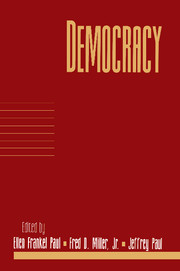Book contents
- Frontmatter
- Contents
- Introduction
- Acknowledgments
- Contributors
- The Very Idea of Popular Sovereignty: “We the People” Reconsidered
- Quasi-Rights: Participatory Citizenship and Negative Liberties in Democratic Athens
- Is There a Duty to Vote?
- Postmodern Liberalism and the Expressive Function of Law
- Democratic Epistemology and Accountability
- Political Quality
- Why Deliberative Democracy Is Different
- The Institutions of Deliberative Democracy
- Democracy as a Telos
- Radical Democracy, Personal Freedom, and the Transformative Potential of Politics
- Democracy and Value Pluralism
- The Problem of Russian Democracy: Can Russia Rise Again?
- Index
Democracy as a Telos
Published online by Cambridge University Press: 03 May 2010
- Frontmatter
- Contents
- Introduction
- Acknowledgments
- Contributors
- The Very Idea of Popular Sovereignty: “We the People” Reconsidered
- Quasi-Rights: Participatory Citizenship and Negative Liberties in Democratic Athens
- Is There a Duty to Vote?
- Postmodern Liberalism and the Expressive Function of Law
- Democratic Epistemology and Accountability
- Political Quality
- Why Deliberative Democracy Is Different
- The Institutions of Deliberative Democracy
- Democracy as a Telos
- Radical Democracy, Personal Freedom, and the Transformative Potential of Politics
- Democracy and Value Pluralism
- The Problem of Russian Democracy: Can Russia Rise Again?
- Index
Summary
INTRODUCTION
My aim in this essay is to distinguish and comment on a specific movement of thought which I shall call “democracy as a telos.” This expression refers to a conception of democracy, cultivated by normative political philosophers, in which all democratic potentialities have at last been realized. The result is thought to be a perfected political community. Democracy as a telos must thus be distinguished from the actual liberal democracies we enjoy at the end of the twentieth century. Indeed, democracy as a telos takes off from a specific rejection of such familiar institutions as elections, political parties, oppositions, a free press, and the rest, which are regarded, according to taste, as individualistic, bourgeois, atomistic, formal, and abstract. Democracy as a telos refers to the theories of reformers who, dissatisfied with our present condition, argue that only a radically transformed democracy can generate a real political community.
A telos is the natural completion of some process, and democracy as a telos suggests that we are en route to a better condition in which life accords as perfectly as may be with democracy. Hence, the term “democracy” in this sense may refer either to the practices that promise to bring this new condition about (such as participation, constitutional reform, ideal speech and deliberation, etc.) or to the new condition of human life itself.
- Type
- Chapter
- Information
- Democracy , pp. 203 - 224Publisher: Cambridge University PressPrint publication year: 2000
- 2
- Cited by

